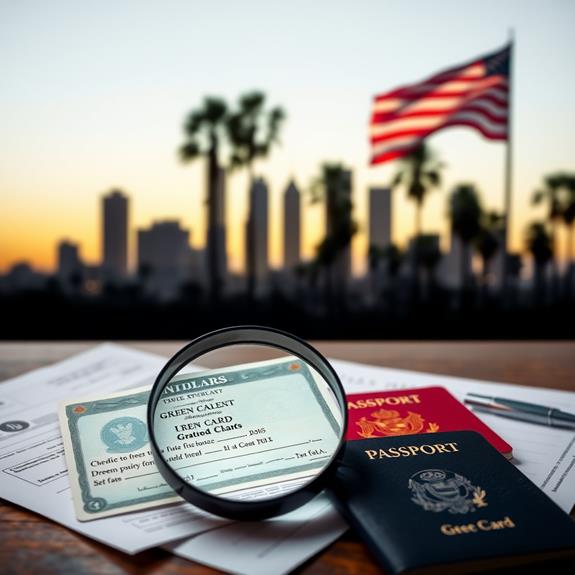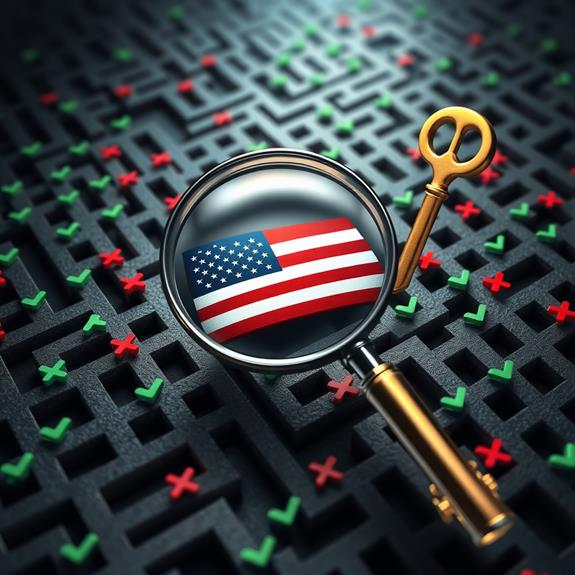To streamline your LA naturalization journey, start by understanding the requirements and gathering essential documents. Organize your records efficiently, including birth certificates, tax returns, and proof of residency. Navigate the N-400 application process carefully, avoiding common pitfalls like incomplete travel histories or undisclosed citations. Prepare thoroughly for the citizenship interview and civics test using official USCIS resources. Seek expert guidance to guarantee you're meeting all criteria and addressing potential issues proactively. Remember, cultural integration and civic participation can strengthen your application. By following these steps and staying informed, you'll be well-equipped to tackle each stage of the naturalization process.
Understanding LA Naturalization Requirements

Los Angeles' naturalization process begins with understanding the fundamental requirements. To become a U.S. citizen in LA, you must be at least 18 years old and a lawful permanent resident for at least five years. If you're married to a U.S. citizen, this requirement drops to three years. You'll need to demonstrate good moral character and basic knowledge of U.S. history and government. Personalized consultation with immigration attorneys can help assess your eligibility and address any unique circumstances or concerns you may have.
Language proficiency is vital. You must show ability to read, write, and speak basic English. However, there are exceptions for older applicants or those with disabilities. Cultural integration plays a significant role in the process. You'll be expected to understand and embrace American values and customs.
Community resources can be invaluable during your journey. LA offers numerous organizations that provide citizenship classes, language assistance, and guidance through the application process. These resources can help you prepare for the naturalization test and interview.
Lastly, you must be willing to take the Oath of Allegiance, pledging loyalty to the United States. This final step marks your shift to full U.S. citizenship, granting you all the rights and responsibilities that come with it.
Gathering Essential Documentation
As you begin gathering essential documentation for your LA naturalization process, it's important to have a clear checklist of required documents. You'll need to collect various personal records, including birth certificates, marriage certificates, and tax returns. Good moral character is a vital component of eligibility, so be prepared to provide police reports, court documents, and other evidence demonstrating your character. Proper labeling and organization of these additional documents are necessary to avoid processing delays. Organizing these documents in advance will help streamline your application and prevent delays in the naturalization process.
Required Documents Checklist
Typically, gathering the required documents is one of the most essential steps in your LA naturalization journey. You'll need to prove your legal residency and prepare for application fees. To make certain you're ready, create a checklist of necessary items. This will help you stay organized and avoid delays in the process. Form N-400 is a significant part of the application process, and it's important to complete it accurately. The biometrics appointment scheduled after submission is also critical for identity verification and background checks.
Your required documents checklist should include:
- Proof of continuous residence in the U.S. for at least five years
- Evidence of physical presence in the country for at least 30 months
- Tax returns for the past five years
- Valid government-issued photo ID
Remember to gather original documents when possible, as copies may not be accepted for some items. You'll also need to provide a completed N-400 form, which is the official application for naturalization. Be prepared to submit two passport-style photos with your application. It's essential to double-check all documents for accuracy and completeness before submitting them. If you're unsure about any requirements, consult with an immigration attorney or accredited representative. They can guide you through the process and help guarantee you have all the necessary paperwork.
Organizing Personal Records
Gathering and organizing your personal records is an essential step in the LA naturalization process. Effective record management will help you stay on top of your application and avoid delays. Start by creating a dedicated folder or binder for all your naturalization documents. This will serve as your central hub for important paperwork.
Organize your records chronologically, separating them into categories such as identification, residency, and employment history. Use clear plastic sleeves or dividers to keep everything neat and accessible. Make copies of all original documents and store them separately for safekeeping. Consider using a secure digital document storage system as a backup.
Keep track of important dates, such as when you first entered the U.S. and any trips abroad. Create a timeline of your residency to guarantee you meet the continuous presence requirements. Don't forget to include records of any name changes, marriages, or divorces. Maintain a list of all addresses where you've lived and jobs you've held during the required period. By staying organized, you'll be well-prepared for your naturalization interview and avoid last-minute scrambles for missing information.
Navigating the N-400 Application Process

As you begin the N-400 application process, it's essential to understand the eligibility requirements for naturalization. You'll need to gather a specific set of documents, which can be simplified by following a clear checklist. By being aware of common mistakes others have made, you can avoid potential delays or complications in your own application.
Eligibility Requirements Explained
The path to U.S. citizenship begins with understanding the eligibility requirements for naturalization. To qualify, you must meet specific age and residency requirements. Generally, you need to be at least 18 years old and have been a lawful permanent resident for at least five years. However, there are exceptions for certain groups, such as those married to U.S. citizens or those who've served in the military.
In addition to age and residency, you'll need to meet other criteria:
- Demonstrate good moral character
- Pass English language and civics tests
- Show continuous residence and physical presence in the U.S.
- Take an Oath of Allegiance to the United States
It's essential to carefully review these requirements before applying. The U.S. Citizenship and Immigration Services (USCIS) provides detailed information on their website. If you're unsure about your eligibility, consider consulting with an immigration attorney or accredited representative. They can help you assess your situation and guide you through the process. Remember, meeting these requirements is just the first step in your naturalization journey.
Document Checklist Simplified
With the eligibility requirements understood, you'll need to navigate the N-400 application process, starting with an essential document checklist. This list will help you gather all necessary paperwork before submitting your application. Begin by collecting your green card, passport, and any travel records from the past five years. You'll also need tax returns and proof of selective service registration, if applicable.
To streamline your document preparation, consider these tips: Create a folder system to organize your papers, and make copies of everything. This approach will save time and reduce stress as you move through the application timeline. Don't forget to include marriage certificates, divorce decrees, or other legal documents that confirm your eligibility.
As you gather documents, pay attention to expiration dates. Verify all IDs and certificates are current. If you're missing any items, start the process of obtaining them early. This proactive strategy will help you avoid delays in your naturalization journey. Remember, thorough preparation now will lead to a smoother application process later.
Common Pitfalls Avoided
Maneuvering the N-400 application process can be tricky, but you'll avoid common pitfalls by staying vigilant. Pay close attention to details and double-check your information before submission. Many applicants make mistakes that can delay their naturalization journey.
To steer clear of these pitfalls, focus on:
- Accurately reporting your travel history
- Providing complete information about your children
- Disclosing all citations, arrests, or convictions
- Ensuring consistent answers throughout the application
Cultural integration plays a significant role in the naturalization process. Demonstrate your commitment to American values and civic participation. Attend local events, volunteer in your community, and stay informed about current affairs.
Community resources can be invaluable during this journey. Seek out free legal clinics, ESL classes, and citizenship preparation courses in your area. These resources can help you navigate complex requirements and improve your chances of success.
Preparing for Citizenship Interview
Preparing for your citizenship interview involves three key steps. First, review all the information in your N-400 application thoroughly. Make sure you can confidently answer questions about your personal history, residency, and eligibility. Second, study the civics test questions and answers. You'll need to know important facts about U.S. history and government. Third, practice your English language skills. The interview will test your ability to speak, read, and write in English.
Interview preparation is essential for success. Create a study schedule and stick to it. Use official USCIS resources, including practice tests and study guides. Consider joining a citizenship class or study group for additional support. As you prepare, focus on confidence building. Practice answering questions out loud, even if it's just to yourself in the mirror. Familiarize yourself with the interview process by watching USCIS videos or attending information sessions. Remember, the more prepared you are, the more confident you'll feel on interview day. Don't hesitate to seek help from community organizations or legal professionals if you need extra guidance. Your hard work will pay off when you're ready to tackle the interview with poise and knowledge.
Mastering the Civics Test

The civics test is a key component of the naturalization process. To succeed, you'll need to master 100 questions about U.S. government and history. Effective civics test strategies and study resources can help you prepare thoroughly. Start by obtaining the official study materials from the U.S. Citizenship and Immigration Services (USCIS) website.
To maximize your learning:
- Use flashcards to memorize key facts and dates
- Practice with online quizzes and mock tests
- Form a study group with other applicants
- Listen to civics podcasts or watch educational videos
Focus on understanding the concepts, not just memorizing answers. Pay special attention to questions about your state's government and representatives. As you study, relate the information to current events to deepen your understanding. Remember, during the actual test, you'll need to answer 6 out of 10 questions correctly. Don't be afraid to ask for clarification if you don't understand a question. With dedication and the right approach, you can confidently master the civics test and move one step closer to becoming a U.S. citizen.
Oath Ceremony and Beyond
After successfully completing all previous steps, you'll receive an invitation to attend the oath ceremony. This event marks the final stage of your naturalization journey. The oath ceremony holds great significance, as it's where you'll officially become a U.S. citizen.
During the ceremony, you'll take the Oath of Allegiance, pledging your loyalty to the United States. It's a solemn and meaningful moment, so dress appropriately and arrive on time. You'll need to bring your green card and any other documents requested in your invitation.
Once you've taken the oath, you'll receive your Certificate of Naturalization. This important document proves your U.S. citizenship. Keep it safe, as you'll need it for various purposes in the future.
After the ceremony, you'll have new post-oath responsibilities as a U.S. citizen. These include registering to vote, updating your Social Security record, and applying for a U.S. passport. You may also want to inform relevant agencies about your new citizenship status. Remember, as a citizen, you now have both new rights and new obligations to your adopted country.

